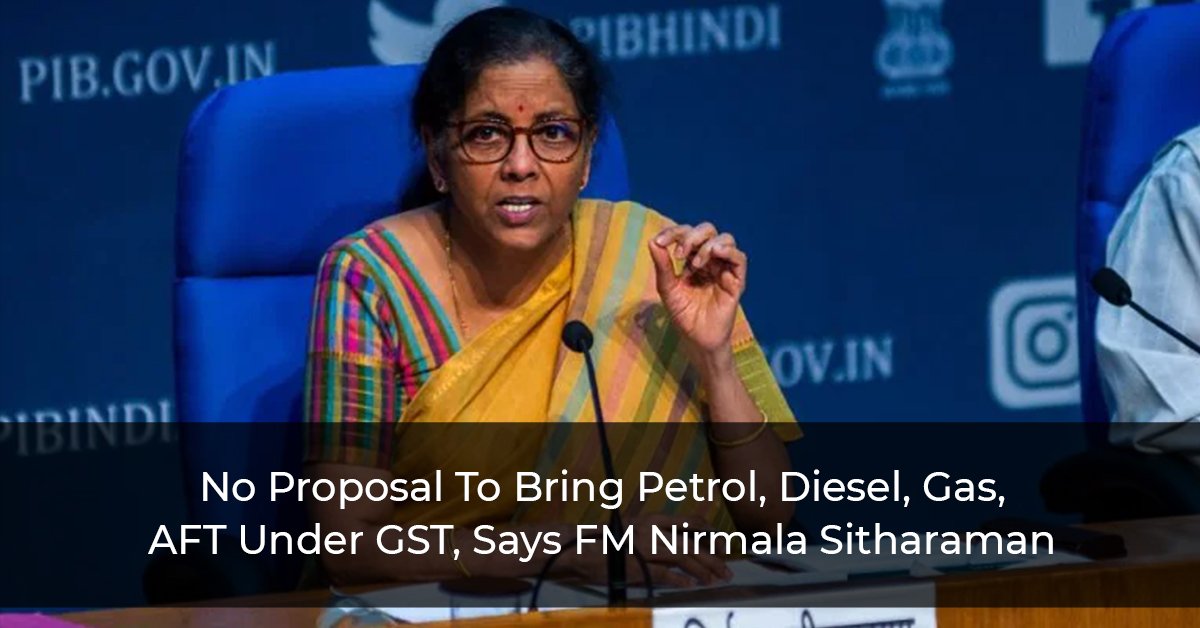Highlights:
- The statement comes at a time when gas prices are at an all-time high
- FM said in a written reply to the Lok Sabha yesterday that the GST council has not recommended that these goods be included in the GST
- Because of an increase in global oil prices, diesel and petrol prices hit all-time highs earlier this month and moreover heavy taxes by govt have also not come down
Nirmala Sitharaman, Finance Minister, said on Monday that there is no plan to put crude oil, jet fuel (ATF), gas, diesel, and natural gas under the Goods and Services Tax (GST) at this time.
Five commodities – crude oil, petrol, natural gas, diesel, and aviation turbine fuel (ATF) – were left out of the GST’s purview when it was enforced on July 1, 2017, merging over a dozen central and state levies. This was due to the central and state governments’ reliance on this sector for revenue.
As a result, the Central government continued to levy excise duties on them while the states-imposed VAT. These taxes, especially the excise duty, have been increased on a regular basis.
While the taxes haven’t changed, a surge in global oil prices due to increased demand has driven gas and diesel prices to all-time highs, causing demand for them to fall under the GST.
In a written response to a question in the Lok Sabha, Ms Sitharaman said, “At this time, there is no plan to put crude petroleum, petrol, diesel, ATF, and natural gas under GST.”
According to the law, the GST Council is accountable for recommending the date on which the goods and services tax be levied on motor spirit (commonly known as petrol), high-speed diesel, petroleum crude, natural gas, and aviation turbine fuel (ATF).
“The GST Council, which includes members from the states, has yet to make a recommendation for the inclusion of these goods under GST,” she said.
She added that the Council can consider the issue of including these five petroleum products at any time it deems necessary, taking into account all relevant factors, including revenue implications.
Also Read: Petrol Price Can Come Down To ₹75 A Litre Under GST: SBI Economist
Incorporating oil products into the GST would not only assist businesses in deducting tax paid on inputs, but it will also add uniformity to the country’s fuel taxation.
In recent weeks, Ms Sitharaman has discussed the inclusion of fuel under GST, as well as the centre and states working together to cut taxes to shield consumers from rising retail prices.
Anurag Singh Thakur, her junior in the finance ministry, responded to a separate query by saying that excise duty on petrol was 19.98 per litre a year ago and is now 32.9. Similarly, the excise duty on diesel has been increased from 15.83 to 31.8 percent.
Mr Anurag Thakur, Minister of State for Finance said, “The excise duty rates have been regulated to generate resources for infrastructure and other developmental items of expenditure, keeping in mind the current financial position.”
He said that “petrol for vehicle” inflation has risen from 7.38 percent in January 2020 to 12.53 percent in January this year, indicating that higher fuel costs have had an effect on general prices.
“Diesel for vehicle” inflation, meanwhile, has risen from 6.44 percent in January last year to 12.79 percent this year, according to him.
Mr Thakur mentioned that the country’s petroleum product prices are benchmarked to foreign product prices.
Minister of State for Finance, Mr Thakur, further explained, “Due to a variety of factors, including the current tax regime and subsidy compensations by respective governments, the price of petroleum products in the country is generally higher/lower in other countries.”
In 2010, the government stopped subsidising petrol, and in 2014, it stopped subsidising diesel. In 2002, ATF pricing was abolished.


